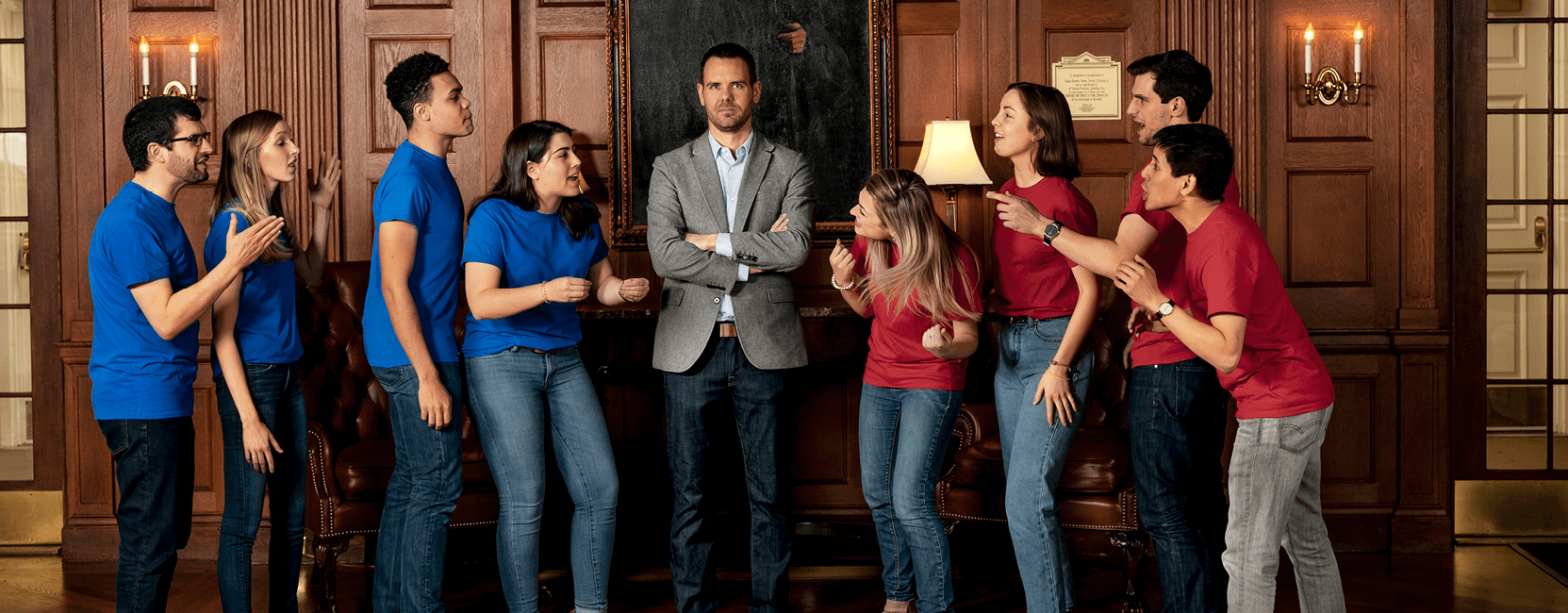Kurt Gray, associate professor of psychology at the University of North Carolina, didn’t set out to explore the depths of the human mind. “I began in geophysics, until I realized I didn’t really love rocks,” he says. “I wanted to study people, so I switched to psychology and never looked back.” Gray is currently researching political intolerance and how the mind makes moral judgments. His investigation comes at a time when a Gallup poll has reported that twice as many Americans oppose marriage outside of their own political party than in the 1950s; nearly two-thirds would not want their daughter or son to marry someone from the other party. Gray, co-author of the highly-praised book, “The Mind Club: Who Thinks, What Feels and Why It Matters,” grew up in Calgary, Alberta, where, he says, “we had political disagreements, but it was nothing like the polarization here in America. We didn’t let politics ruin Thanksgiving dinner.” By working with students as well as a cross section of everyday Americans to measure individuals’ willingness to engage with different ideas, he hopes his work could eventually “help build a strong democracy—and make small-talk more pleasant.” – Patrick Cooke
Has psychology been left out of the discussion of intolerance in the past? Has anybody ever asked the profession’s help?
Psychology is often used to help change people’s behavior. In health care, for instance, Obama had a “nudge unit” (behavioral economics study) that leveraged psychology and found small tweaks to improve people’s lives in big ways. Because of these successes, psychology is joining more discussions about pressing social issues, like political intolerance.
Everyone perceives the world in their own way. What happens when individuals’ perceptions clash?
The two things that I study most are perceptions of minds and moral judgements. You can’t directly experience another person’s mind so you’re left to infer what someone else might think and feel. For example, when a liberal is clashing with a conservative, or vice versa, they might conclude, ‘This person doesn’t have the ability to think and feel as I do; they have a lesser mind than my own.’
So both sides arrive at a similar conclusion about the other by the same process.
Some studies in the past have suggested that liberals and conservatives have different moral minds and different moral senses. But my research suggests that isn’t the case. We have the same moral mind, based on the perception of harm.
So the perception of harm is the key?
Yes, and perceptions of harm are closely tied to the perception of immorality. If you see an issue as immoral, you see it as causing harm. And those who seem to do evil— like people across the aisle— appear incapable of suffering harm. Political opponents seem more like villains than victims. We see others as either moral agents or moral patients, villains or victims. If you view a person on the other side as a villain who is insensitive to harm, you also see them as incapable of suffering. For example, say there’s a worker in the Midwest who voted for Trump but loses his manufacturing job to outsourcing to China. Lots of liberals would think, ‘Well, he’s not really suffering because he’s the architect of his own unemployment, so I’m not going to take his viewpoint seriously. What’s more, he’s a villain and I can’t take his moral standing seriously because he can’t legitimately be suffering.’ Likewise, look at the recent Parkland school shootings. A bunch of kids whose friends were murdered took to the streets and airwaves to argue for increased gun control. The pro-gun lobby cast them as villains, which made them seem incapable of their suffering. Now, I would wager that these kids did suffer by watching their friends die in front of them. If you ask anyone if they objectively suffered, most people would say yes. But if you’re a gun advocate who sees them as villains, it interferes with your ability to acknowledge suffering and de-legitimizes their moral stance.
Even if conservatives and liberals acknowledge their own intransigence, do they often forgive their own biases in the belief that it’s the only way to combat the villainy of other side?
That’s certainly true. Morality can be used for the justification of a lot of things. Religious conflicts are a clear demonstration of this. And war in general. Before a war you always see a ratcheting up of moral rhetoric, of us vs. them: We are on the side of goodness and they are on the side of evil.
Americans have always had political and cultural disagreements. But does it strike you that we’ve never taken them so personally and so angrily as we do now?
As we move further apart we see the other side as increasingly antagonistic. We then see them as more harmful and that pushes us even further apart. Once you begin associating someone’s behavior with harm then those behaviors are seen as intrinsically immoral. That’s what’s been unfolding over the past couple of decades.
Does your research offer a way to bridge this growing political divide?
Liberals and conservatives disagree on a lot of things, but they both agree that morality is grounded in perceptions of harm. It’s the same moral mind at work for both. For example, we all agree that we need to take care of children and protect people who are vulnerable. So, my research actually offers a hopeful perspective on moral disagreement—that it is possible to bridge the gap and emphasize these shared harm-based concerns. Ideally, it will show the way toward making political conversations less antagonistic, not only in the chambers of Congress but also around the Thanksgiving dinner table.
The late senator John McCain was praised by both the left and the right for his ability to seek compromise with opponents without demonizing them. You might say he was able to consider the other side’s point without perceiving them as doing harm. Should Senator McCain be considered the model for a successful means to bridging the gulf between camps?
The ability to disagree without demonizing it the key to having rational political discourse and a healthy democracy. I think McCain realized that although politicians across the aisle often disagreed with his specific policies, they had the same goals and hopes for the country as he did.
College campuses are a battleground for tribal conflicts today. What do you hear from your students at UNC? Do you find them intransigent, or open to compromise?
There’s this perception that students are especially averse to the marketplace of ideas, but my experience is that they’re actually more receptive to viewpoints from an opposing side. At least the ones in my seminars. I think if you went to the average American adult and said, ‘Hey, let’s talk about how your viewpoints might be wrong,’ you would get a lot of opposition. Students are more open-minded than we might expect given the recent media coverage about them.











